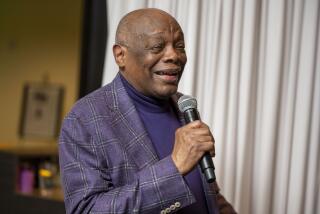Volney V. Brown Jr. : Case Puts Spotlight on Obscure Magistrate
- Share via
U.S. Magistrate Volney V. Brown Jr. leaned solicitously from the bench. His eyes were sad, his voice was pained.
“I’m filled with apprehension and concern for this...gallant old man,” the magistrate said of accused Nazi mass murderer Andrija Artukovic.
Eyebrows arched around the courtroom; the prosecutor seemed momentarily baffled. Only a few days earlier Brown had ordered Artukovic--accused of masterminding the deaths of more than 700,000 Serbs, Jews and Gypsies in World War II concentration camps--extradited to Yugoslavia.
The same day, Brown interrupted the extradition hearing of former Mexico City Police Chief Arturo Durazo Moreno, accused of accumulating a $9-million fortune through corruption, when he realized, with a gasp, “I’ve forgotten” to greet the prisoner.
“Good morning, Gen. Durazo!” Brown said, being careful to use Durazo’s ceremonial title.
“Politeness is a lubricant,” the magistrate said later, as he relazed in his chambers. “When people are on their best behavior, things go well.”
Until a few weeks ago, Brown worked in relative obscurity as the junior magistrate among seven in the Los Angeles area, presiding over such routine matters as collecting fines and setting bail and arraignment dates.
Then he drew, by lot, two of the most widely publicized extradition cases in recent years here, and suddenly the fate of an accused Nazi mass murderer and a prominent Mexican fugitive reested in his hands.
Feet on the desk, sitting under a needlepoint of USC’s “Tommy Trojan” that his wife, Peggy, had fashioned, Brown discussed his judicial style.
“Every case you have in front of you impacts someone. How can you not care? Even the guilty ones have a right to be treated as human beings...I insist on politeness,” he said, suggesting there is not enough “politeness” and “Compassion in the courtroom.”
Brown, 58, is a tall, bespectacled man with thinning red hair and a patrician’s bearing--a conservative, fourth-generation California born to a well-to-do Beverly Hills family who has spent his days pursuing public service and the good life.
The last long newspaper story about him was an account of a gala cocktail cruise off Newport Beach that he and his wife, his college sweetheart, threw for about 60 friends. A society writer gushed: “Peggy distributed balloons as V.V. hopped aboard with enormous cans of popcorn, and the sunglassed guests clamored down the ramp to the dock...(where) the ‘Fo’ Pa, the senior Browns’ 36-foot cabin cruiser, was docked...”
“Oh, please,” Brown said the other day when reminded of the event.
That was in the 1960s, when the name Volney V. Brown (his grandfather thought up the name Volney because he wanted an “uncommon” complement to Brown( was familiar to radio listeners around Southern California.
“Looking for a good mortgage loan? See Volney V. Brown,” a friend recalled the radio advertisements of late 1950s and ‘60s, when Volney Jr. and Volney Sr. ran the family mortgage brokering business.
Brown graduated with an accounting degree from UCLA and a law degree from USC. After leaving the family mortgage business in 1966, he worked as a Beverly Hills criminal defense attorney. In 1972, Brown was appointed regional director of the Nixon Aministration’s Drug Abuse Law Enforcement program, intended to rid the nation of street heroin peddlers.
The project was phased out 18 months later, but Brown stayed on with the federal government, moving to Washington for a time to oversee the appellate division of the Justice Department’s Freedom of Information section.
He returned to Los Angeles in 1979 as an assistant U.S. attorney, handling civil cases. he was appointed to the $68,400-a-year magistrate’s job 2 1/2 years ago by a panel of federal judges.
Some court observers--not for attribution--call him plodding and conscientious to a fault; some describe him as “old worldly,” even courtly. Everyone says he tries to be fair.
The day Brown called Artukovic a “gallant old man,” the prosecutor in the case described Brown as “unfailingly courteous, prompt and fair.” He gives “all parties a full opportunity to give their sides,” Assistant U.S. Atty. David Nimmer said.
The gap between Brown’s actions and words in the Artukovic case, however, has caused the accused murderer’s son, Rad, to question Brown’s sincerity.
“On a number of occasions, the magistrate had made positive statements then rules the other way,” a bitter Rad Artukovic said Tuesday, after Brown refused to block his father’s transfer to a Missouri prison hospital.
The son said that describing his father as gallant one day, then allowing the transfer five days later is a good example of how Brown’s “actions speak louder than words.”
Brown said he is pleased by the reputation for fairness some believe he has. He said it is a trait he acquired in six years as a prosecutor and another six years as a defense attorney. Whether the matter before his court is a dispute over a $10 fine or a major extradition case. Brown said, “I give as much attention to one as I do the other.
“If you don’t,” he added, “then you have people going out of my courtroom saying the system doesn’t work.”
Tell Brown that people say he is conscientious to a fault, and he grimaces.
“Conscientious to a fault? That’s the job description, isn’t it?” he said, adding that there is room for more conscientiousness in America’s courtrooms. “I don’t see how you can be too conscientious unless it leads to paralysis, and I plead innocent to paralysis.”
More to Read
Sign up for Essential California
The most important California stories and recommendations in your inbox every morning.
You may occasionally receive promotional content from the Los Angeles Times.










